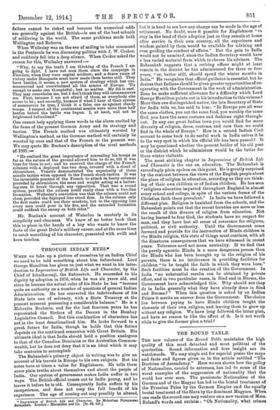THROUGH INDIAN EYES.* WIIEN we take up a picture of
ourselves by an Indian Chief we need to be told something about him beforehand. Lord George Hamilton has given us just what we want in his intro- duction to Impressions of British Life and Character, by the Chief of Ichalkaranji, the Babasaheb. He succeeded to his dignity by adoption in 1876, when he was six years old, and since he became the actual ruler of his State he has " become quite an authority on a number of questions of general Indian Administration. He has converted the indebtedness of his State into one of solvency, with a State Treasury at the present moment possessing a considerable balance." He is a Mahratta Brahmin, and for the last fourteen years he has represented the Sirdars of the Deccan in the Bombay Legislative Council. But this combination of characters has not in the least denationalized him. He looks forward to a great future for India, though he holds that this future depends on the continued connexion with Great Britain. His ultimate ideal is that India should hold a position analogous to that of the Canadian Dominion or the Australian Common- wealth, but he does not deny that it is an ideal which it may take centuries to accomplish.
The Babasaheb's primary object in writing was to give an account of his travels in Europe to his own subjects. But his notes have at times a value for Englishmen. He tells them some plain truths about themselves and about the people of India. Our system of government makes India suffer in two ways. The British official comes out to India young, and he leaves it before he is old. Consequently India suffers by his inexperience, and does not reap the full benefit of his experience. The age of coming out may possibly be altered,
Impression of British Life and Character. By Meherban Barayanzao Babasaheb. London ; Macmillan and Co. [Ss. 6d, net.J
but it is hard to see how any change can be made in the age of retirement. No doubt, were it possible for Englishmen " to stay in the land of their adoption just as they remain at home after service in their own country, all the experience and wisdom gained by them would be available for advising and even guiding the conduct of affairs." But the gain to India would not be unmixed, since the Indian Secretary would have a less varied material from which to choose his advisers. The Babasaheb suggests that a retiring officer might at least remain in the district he has administered for three or four years, "or, better still, should spend the winter months in India." He recognizes that official guidance is essential, but he desires that Indians should be given greater opportunities of co- operating with the Government in the work of administration. Does he make sufficient allowance for a difficulty which Lord George Hamilton points out in his introduction to this volume? More than one distinguished native, the late Secretary of State for India tells us, has said to him : "In Europe you all wear the same clothes, you eat the same food, you worship the same God, you have the same customs and fashions right through- out. In any one great Indian town you would find far more diversity of religion, dress, customs, and race than we could find in the whole of Europe." How is a retired Indian Civil servant to come back to do useful work in India unless it be to the very spot in which his official life has been passed ? It may be questioned whether the present holder of his old post or the district which he administers would be the better for these winter visitants.
The most striking chapter in Impressions of British, Life and Character is the one on education. The Babasaheb is exceedingly plain spoken on this point. He is greatly surprised by the contrast between the views of the English people about the place of religion in education, according as they are think- ing of their own children or of Indian children. He has seen "religious education imparted throughout England in almost every school and college, in spite of the various forms of the Christian faith there prevalent." In India we have followed a different plan. Religion is banished from the schools, and the Babasaheb points out that the recent troubles are more or less the result of this divorce of religion from education. Not having learned to fear God, the students have no respect for man, and they have lost all sense of reverence for religious, political, or civil authority. Until the Government come forward and provide for the instruction of Hindu children in the Hindu religion, this state of things must continue, with all the disastrous consequences that we have witnessed in recent years. Tolerance need not mean neutrality. If we find that the purely agnostic Hindu is a more dangerous person than the Hindu who has been brought up in the religion of his parents, there is no intolerance in providing facilities for children "to be taught the faith in which they were born." Such facilities must be the creation of the Government. In India "no substantial results can be obtained by private effort, and in two particular cases, in Sind and in Burma, the Government have acknowledged this. Why should not they do in India generally what they have already done in Sind and Burma ? " When this question is asked by an Indian Prince it merits an answer from the Government. The choice lies between paying to have Hindu children taught the elements of their own religion, and leaving them to grow up without any religion. We have long followed the latter plan, and have no reason to like the effect of it. Is it not worth while to give the former plan a trial ?














































 Previous page
Previous page